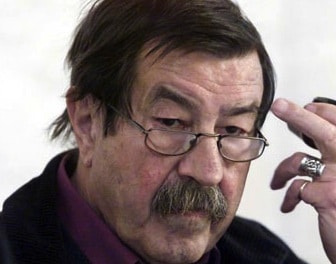DISCLOSURE: VT condemns the horrific tragedy committed by the NAZI Party against Jewish Citizens of Europe during Word War II known as the "Holocaust". VT condemns all racism, bigotry, hate speech, and violence. However, we are an open source uncensored journal and support the right of independent writers and commentors to express their voices; even if those voices are not mainstream as long as they do NOT openly call for violence. Please report any violations of comment policy to us immediately. Strong reader discretion is advised.
“The threat is always there to Israel. The threat changes as Netanyahu, or whoever governs Israel at the time, sees a new threat to Israel’s long-protected narrative of why Israel is never wrong.”
by James M Wall
A stunning new poem by German novelist Günter Grass, has “broken the silence” on Israel as a nuclear power.
Western journalists and politicians have long enforced that silence by unspoken and unwritten common agreement.
The silence was successfully imposed for two reasons: The Holocaust and the fear of being called anti-Semitic.
Günter Grass has broken that silence with his poem, Was gesagt werden muss (What must be said).
Grass is a major figure in German literature. He speaks with considerable authority through his extensive and innovative writing. He is considered one of Germany’s major novelists.
The press release announcing his 1999 Nobel Prize for Literature begins:
When Günter Grass published The Tin Drum in 1959 it was as if German literature had been granted a new beginning after decades of linguistic and moral destruction.
Within the pages of this, his first novel, Grass recreated the lost world from which his creativity sprang, Danzig, his home town, as he remembered it from the years of his infancy before the catastrophe of war.
Here he comes to grips with the enormous task of reviewing contemporary history by recalling the disavowed and the forgotten: the victims, losers and lies that people wanted to forget because they had once believed in them.
In 1979, The Tin Drum reached a world audience through a film of the same title, by German Director Volker Schlöndorff. The novel, which was brilliantly reproduced in the film, was praised by the Nobel Committee because of the way in which it:
Breaks the bounds of realism by having as its protagonist and narrator an infernal intelligence in the body of a three-year-old, a monster who overpowers the fellow human beings he approaches with the help of a toy drum.
The unforgettable Oskar Matzerath is an intellectual whose critical approach is childishness, a one-man carnival, dadaism in action in everyday German provincial life just when this small world becomes involved in the insanity of the great world surrounding it.
It is not too audacious to assume that The Tin Drum will become one of the enduring literary works of the 20th century.
Now, over a decade into the 21st century, Gunter Grass decides that Israel, must be stopped from self-destruction before it is too late.
Through this deep concern, Grass wrote his poem, This Must Be Said, breaking decades of silence. Grass, now 84, says in the poem that he wrote with his “last ink”.
The entire poem may be read, and should be read, in its entirety. Click here for an English translation:
Here, as an introduction, are the first three sections of the poem:
Why have I kept silent, silent for too long
over what is openly played out
in war games at the end of which we
the survivors are at best footnotes.It’s that claim of a right to first strike
against those who under a loudmouth’s thumb
are pushed into organized cheering—
a strike to snuff out the Iranian people
on suspicion that under his influence
an atom bomb’s being built.But why do I forbid myself
to name that other land in which
for years—although kept secret—
a usable nuclear capability has grown
beyond all control, because
no scrutiny is allowed.
Later in the poem, Grass writes that the country with a nuclear arsenal that “has grown beyond all control, because no scrutiny is allowed”, is the modern state of Israel.
That lack of scrutiny of Israel’s nuclear arsenal has provided Israel with carte blanc to occupy Palestinian land, and to literally imprison the Palestinian people, all under the pretense of a need for the “security” of a nuclear armed Israel.
This same lack of scrutiny has also given Israel the freedom to function “behind the scenes” to shape the foreign policy of the West, a policy implemented by successive American governments trapped in the vise-like control of Israel’s two sacrosanct iron fists: The Holocaust and anti-Semitism.
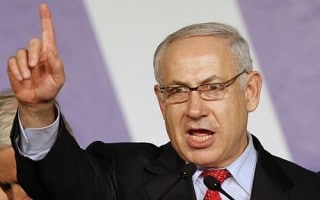 How has Israel responded to Grass’ poem? It has followed their usual pattern, reacting with classic Israeli paranoid rhetoric.
How has Israel responded to Grass’ poem? It has followed their usual pattern, reacting with classic Israeli paranoid rhetoric.
First out of the box was Israeli Prime Minister Benjamin Netanyahu, who said Israel will not tolerate anyone with credibility and a public platform, who exposes the truth of Israel’s nuclear arsenal.
Only he does not say it that way, for that would be an admission of the unsayable, that Israel does indeed have such an arsenal.
In a statement, Israeli Prime Minister Benjamin Netanyahu condemned German Nobel laureate Günter Grass for his “shameful moral equivalence”.
“Gunter Grass’s shameful moral equivalence between Israel and Iran, a regime that denies the Holocaust and threatens to annihilate Israel, says little about Israel and much about Mr. Grass,” Netanyahu said.
This reaction is the classic Israeli response when a cover story is exposed as false: Never deny, always attack and divert.
Netanyahu cannot deny the truth of Grass’ poem, so he attacks the messenger.
Grass also has his supporters. Jakob Augstein, a columnist for the leading German newspaper, Der Spiegel writes:
The brief lines that Günter Grass as published under the title “What Must Be Said” will one day be seen as some of his most influential words. They mark a rupture.
It is this one sentence that we will not be able to ignore in the future: “The nuclear power Israel is endangering a world peace that is already fragile.”
It is a sentence that has triggered an outcry. Because it is true. Because it is a German, an author, a Nobel laureate who said it. Because it is Günter Grass who said it.
And therein lies the breach. And, for that, one should thank Grass. He has taken it upon himself to utter this sentence for all of us.
The New York Times reported the story entirely from Israel’s perspective. In the story on the poem, the Times ignored the truthfulness of the poem and focused instead on the “controversy” it stirred up. Why should we expect anything different? It is the Times, after all, that has been a major player in the “protect Israel’s narrative” campaign.
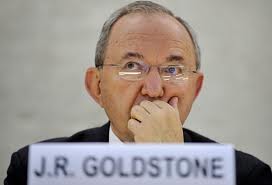 We have seen before how Israel manipulates any story it deems a threat.
We have seen before how Israel manipulates any story it deems a threat.
In 2009, the Goldstone Report revealed the details of Israel’s massive slaughter of citizens in Gaza, a three week assault carried out in the name of Israeli security.
In the initial report from a UN panel chaired by Judge Richard Goldstone an eminent South African jurist experienced in tackling war crimes cases and himself an avid Jewish Zionist, concluded “that Israel had committed multiple war crimes and possible crimes against humanity during its 2008-09 invasion.”
Did Israel deny the Goldstone Report? Of course not. The evidence was too overwhelming. Rather than confront the truth of Goldstone’s findings, Judge Goldstone was hauled off to South Africa, his native land, where he held personal meetings with rabbis there.
Soon, Judge Goldstone had second thoughts. He wrote a Washington Post op ed in which he famously said
“If I had known then what I know now, the Goldstone Report would have been a different document.”
The Palestine Chronicle examines further the aftermath:
Goldstone does not with any clarity explain what he means by this sentence. Paradoxically and shamefully for the judge, the more we know about the Gaza massacre, the more accurate the Goldstone Report appears – not less.
We may never know why Goldstone changed his position – it is certainly not the result of new revelations refuting the report’s validity, irrespective of what he implied in his article.
We know that he had been the subject of an international smear campaign of unprecedented dimensions and nastiness. Maybe the pressure was simply too much for him.
But even in this case, it is hard to understand why he caved in now. In fact, attempts to discredit the Goldstone Report themselves been been discredited over the past year.
Did Goldstone succumb to pressure or threats? No one knows.
What we do know for sure is that a US diplomatic cable released by WikiLeaks has Israel’s prime minister, Binyamin Netanyahu, saying that Israel was facing “three principal threats: Iran’s nuclear [programme], missile proliferation and the Goldstone Report.”
The Goldstone Report was the 2009-10 du jour “threat to Israel”.
Today the du jour “threat to Israel” is Gunter Grass and his poem, What Must be Said.
The threat is always there to Israel. The threat changes as Netanyahu, or whoever governs Israel at the time, sees a new threat to Israel’s long-protected narrative of why Israel is never wrong.
Any sign that anyone is breaking ranks on the silence surrounding that narrative, which has long included development of a nuclear arsenal in Dimona, Southern Israel, must suffer personal attacks.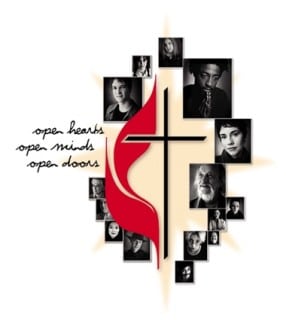
Israel is all that matters to Israel, regardless of the consequences to others. Unfortunately, thanks to AIPAC and its army of strong-armed warriors assigned to control US government officials and church leaders, the silence is rarely broken in US domestic politics.
Three US Protestant denominations, the United Methodists, Presbyterian Church, and the Episcopal Church, in that order, will hold national decision-making conferences between April 24 and mid-July.
These denominational leaders will attend to church business, budgets, reports, and honoring their retirees, that sort of thing. This year each body will also take up the matter of Israel’s treatment of the Palestinian people.
The United Methodists and Presbyterians will consider resolutions which are both the result of many years of conversation and study, and will then ask officials to agree to divesting church funds from three corporations which have refused church requests to stop providing products that enable the Occupation to continue.

The Episcopal Church is about five to eight years behind the United Methodists and Presbyterians. All they are asking this time around is for Episcopalians to consider how Palestinians are suffering under Occupation. And of course, to celebrate the importance of Jewish/Christian relations.
Even that is too much for the Episcopalians, which seem thus far to be following the leadership of their Presiding Bishop, Katharine Jefferts Schori, who has her constituents to have conversations and break bread with their local Jewish neighbors.
What has rankled Episcopalians, however, is that in their mild resolution on Israel/Palestine, a special Episcopal version of a study book entitled Steadfast Hope, is recommended for local church study.
Steadfast Hope has something positive to say about the BDS strategy. It does not call for adopting that strategy. It simply suggests BDS be studied.
For more on this discussion, see this recent posting from Wall Writings. I especially urge readers to scroll down for the follow-up comments.
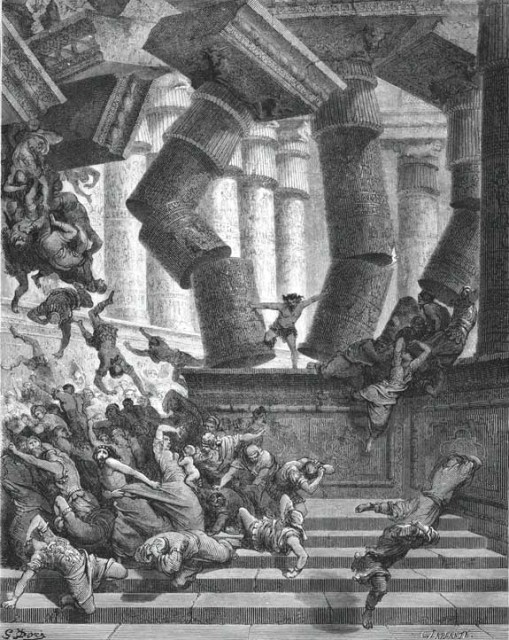 I believe Gunter Grass, without knowing it, was speaking to all those gullible Protestants who still believe that the tactic of a nonviolent protest of divesting church funds from corporations that support the Occupation, is not good for Israel.
I believe Gunter Grass, without knowing it, was speaking to all those gullible Protestants who still believe that the tactic of a nonviolent protest of divesting church funds from corporations that support the Occupation, is not good for Israel.
BDS (Boycott, Divestment and Sanctions) is also not a threat to the “fragile interfaith” relationship between Protestants and Jews.
Delegates to the upcoming church decision-making conferences should read Gunter Grass’ poem. He is speaking truth to you, just as he is speaking truth to Israel, his spiritual homeland.
This German writer is concerned with the future of his tribal, spiritual homeland, Israel, which is so obsessed with “security”, even as it sits atop all those nuclear bombs.
Like Sampson of old, Israel is agitating have the US join with it, to pull down those pillars and destroy huge sections of this planet in a nuclear holocaust.
Grass chose to break his own self-imposed silence because he believes Israel needs an “intervention”, a process whereby people who truly love their spiritual homeland, will persuade Israel that it is currently embarked on suicidal course of action, harmful to itself and to others.
An “intervention” is designed to save that which we love. At the moment, Israel is veering dangerously close to the Sampson Option.(See Seymour Hersh’s 1991 book of that name.)
Grass does not want to see a nuclear-armed Israel destroy itself and threaten further the already “fragile” world peace.
Neither should we. A nonviolent step like BDS (Boycott, Divestment and Sanctions) is the least we can do to play a role in Israel’s “intervention”.
Editing: Debbie Menon
 James M. Wall is currently a Contributing Editor of The Christian Century magazine, based in Chicago, Illinois. From 1972 through 1999, he was editor and publisher of the Christian Century magazine. He has made more than 20 trips to that region as a journalist, during which he covered such events as Anwar Sadat’s 1977 trip to Jerusalem, and the 2006 Palestinian legislative election. He has interviewed, and written about, journalists, religious leaders, political leaders and private citizens in the region. Jim served for two years on active duty in the US Air Force, and three additional years in the USAF (inactive) reserve. His website: Wall Writings
James M. Wall is currently a Contributing Editor of The Christian Century magazine, based in Chicago, Illinois. From 1972 through 1999, he was editor and publisher of the Christian Century magazine. He has made more than 20 trips to that region as a journalist, during which he covered such events as Anwar Sadat’s 1977 trip to Jerusalem, and the 2006 Palestinian legislative election. He has interviewed, and written about, journalists, religious leaders, political leaders and private citizens in the region. Jim served for two years on active duty in the US Air Force, and three additional years in the USAF (inactive) reserve. His website: Wall Writings
Helen Thomas on her one question for Obama
ATTENTION READERS
We See The World From All Sides and Want YOU To Be Fully InformedIn fact, intentional disinformation is a disgraceful scourge in media today. So to assuage any possible errant incorrect information posted herein, we strongly encourage you to seek corroboration from other non-VT sources before forming an educated opinion.
About VT - Policies & Disclosures - Comment Policy

